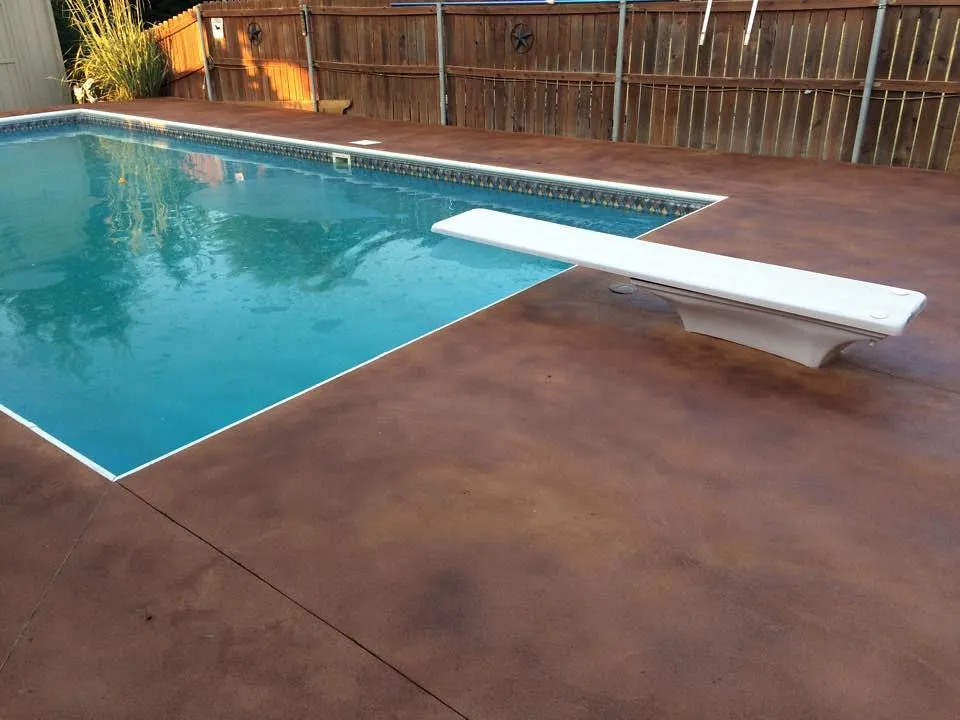Pool Decks of Tampa Blog
Welcome to Pool Decks of Tampa Blog! Here, we dive into the world of pool deck design, installation, and maintenance.

Sun-Kissed Surfaces: Best Materials for Your Pool Deck Resurfacing
As we dive into the world of pool deck resurfacing, let's bask in the warm embrace of sun-kissed surfaces. When it comes to choosing the best materials for your pool deck, the options seem endless. Concrete, natural stone, pavers, wood, and composite materials all hold the promise of transforming your poolside oasis. But which one will truly stand the test of time? Join us on this journey as we explore the pros and cons of each material, unraveling the secrets to creating a pool deck that not only shimmers in the sunlight but also withstands the elements.
Concrete
Concrete is a popular choice for pool deck resurfacing due to its durability and versatility. When it comes to transforming your pool deck into an inviting and stylish space, concrete offers a wide range of options. One of the advantages of using concrete for pool deck resurfacing is the ability to create unique stamped patterns. These patterns can resemble natural materials like stone, tile, or even wood, adding a touch of elegance to your pool area.
In addition to stamped patterns, concrete also provides a variety of colored options for your pool deck. Whether you prefer a classic look with neutral tones or want to make a bold statement with vibrant colors, concrete can be customized to suit your style. From earthy browns and sandy beiges to cool blues and warm reds, the color possibilities are endless.
Not only does concrete offer aesthetic benefits, but it is also highly durable. It can withstand heavy foot traffic, harsh weather conditions, and exposure to pool chemicals without losing its integrity. Moreover, concrete is easy to maintain, requiring minimal effort to keep it looking pristine.
Natural Stone
When it comes to pool deck resurfacing, another popular option that provides a natural and timeless look is natural stone. Natural stone offers a wide range of benefits and advantages, making it a popular choice among homeowners. One of the pros of using natural stone for pool deck resurfacing is its durability. Natural stone, such as granite or travertine, is known for its strength and ability to withstand harsh weather conditions. It is also resistant to fading, making it a long-lasting option for your pool deck. Another advantage is its aesthetic appeal. Natural stone adds a touch of elegance and sophistication to any outdoor space, giving your pool area a luxurious feel.
However, there are also some cons to consider when choosing natural stone for pool deck resurfacing. One of the drawbacks is its cost. Natural stone can be more expensive compared to other materials. Additionally, natural stone requires regular maintenance to keep it looking its best. It needs to be sealed regularly to protect it from stains and water damage. Despite these drawbacks, many homeowners still consider natural stone as their top choice for pool deck resurfacing due to its timeless beauty and durability.
There are several popular types of natural stone that are commonly used for pool deck resurfacing. Travertine is a popular choice because of its versatility and natural slip resistance. It comes in various colors and finishes, allowing you to customize the look of your pool deck. Another popular option is granite, known for its durability and resistance to heat. Its natural speckled appearance adds a unique touch to any pool deck. Limestone is another natural stone option that offers a classic and sophisticated look. Its light color makes it a great choice for pool decks in warmer climates as it stays cool underfoot.
Pavers
Pavers offer a versatile and durable option for pool deck resurfacing. When it comes to resurfacing your pool deck, pavers are a popular choice due to their numerous benefits. One of the main advantages of pavers is their durability. Made from materials such as concrete or natural stone, pavers are built to withstand heavy foot traffic, pool chemicals, and harsh weather conditions. This ensures that your pool deck will remain in excellent condition for years to come.
Another benefit of using pavers for pool deck resurfacing is their versatility. Pavers come in a wide range of colors, shapes, and patterns, allowing you to create a customized look for your pool area. Whether you prefer a sleek and modern design or a more traditional look, pavers can be arranged in various ways to suit your style preferences. Additionally, pavers are easy to maintain. If a paver becomes damaged or stained, it can be easily replaced without having to redo the entire pool deck.
The installation process of pavers for pool decks is relatively straightforward. First, the existing pool deck surface is cleaned and prepared. Then, a layer of sand or gravel is laid down as a base. The pavers are then placed on top of the base, ensuring that they are level and properly aligned. Finally, sand is swept into the gaps between the pavers to secure them in place. Overall, pavers provide a beautiful and long-lasting solution for pool deck resurfacing, making them a popular choice among homeowners.
Wood
We can explore the option of using wood for pool deck resurfacing. Wood can add a warm and natural aesthetic to your pool area, creating a relaxing and inviting atmosphere. However, it is important to consider the maintenance required for wood decks. Regular maintenance, such as staining and sealing, is necessary to protect the wood from moisture and UV damage. Neglecting wood maintenance can lead to rotting, warping, and splintering.
When choosing the type of wood for your pool deck, it is crucial to select a species that is resistant to water and decay. Some popular choices for pool decks include cedar, redwood, and pressure-treated lumber. Cedar and redwood are naturally resistant to rot and insects, making them ideal for outdoor applications. Pressure-treated lumber, on the other hand, is chemically treated to resist decay and insect infestation. It is important to note that pressure-treated lumber contains chemicals that can be harmful if ingested, so caution should be exercised, especially if you have children or pets using the pool deck.
Composite Materials
One popular choice for pool deck resurfacing is to use composite materials. Composite materials are made of a blend of wood fibers and plastic, offering a durable and low-maintenance option for your pool deck. When comparing composite materials to concrete, there are several pros and cons to consider.
One advantage of using composite materials for pool deck resurfacing is their durability. Composite materials are resistant to rotting, warping, and splintering, making them ideal for outdoor spaces exposed to water and sunlight. Additionally, composite materials are available in a variety of colors and textures, allowing you to create a customized and aesthetically pleasing pool deck.
Another advantage of using composite materials is their low maintenance requirements. Unlike concrete, composite materials do not require regular sealing or staining. They are also resistant to mold and mildew, reducing the need for frequent cleaning. Additionally, composite materials are less likely to fade or discolor over time, helping your pool deck maintain its vibrant appearance.
However, it is important to consider some drawbacks of using composite materials. Firstly, composite materials tend to be more expensive than concrete. Additionally, while composite materials are durable, they can still scratch and fade over time, especially in high-traffic areas. Finally, composite materials may not have the same natural look and feel as wood or concrete, which could be a drawback for some homeowners.
Conclusion
In conclusion, when it comes to pool deck resurfacing, there are several great options to consider. Concrete provides durability and versatility, while natural stone adds a touch of elegance. Pavers offer a wide range of design possibilities, and wood creates a warm and inviting atmosphere. Composite materials combine durability with low maintenance. Ultimately, the best choice will depend on your personal preferences and the overall aesthetic you want to achieve for your pool area.
© Copyright 2026 Pool Decks of Tampa. All Rights Reserved.
Zip codes we serve:
33755,33757,33758,33766,33765,33756,33767,33769,34697,33763,34698,33770,33775,33779,33764,33761,33786,33771,33759,34695,34660,33778,33760,34682,33773,33774,34683,34681,34677,33785,34684,33762,33782,33777,33776,33772,33729,34685,33781,33780,33635,33744,33709,33716,34689,33708,33615,33626,33738,33702,34688,33714,33710,33607,33747,33634,33713,34692,33625,33703,34690,34691,33704,33731,33732,33733,33734,33736,33740,33742,33743,33784,33707,33609,33556,33730,34680,33701,33706,33614,33664,33624,33629,33616,33741,33611,34655,33688,34652,33712,33705,33608,33618,34656,34653,33621,33603,33606,33602,33646,33711,33601,33622,33623,33630,33631,33633,33650,33655,33660,33672,33673,33674,33675,33677,33679,33680,33681,33682,33684,33685,33686,33687,33689,33694,33604,33558,34673,33612,33548,33605,33613,34668,33549,33715,33620,34638,34654,33617,33610,33619,33637,33559,34674,33534,33570,33572,33571,33586,33575,33647,34669,33578,34637,33550,34667,34639,33510,33584





